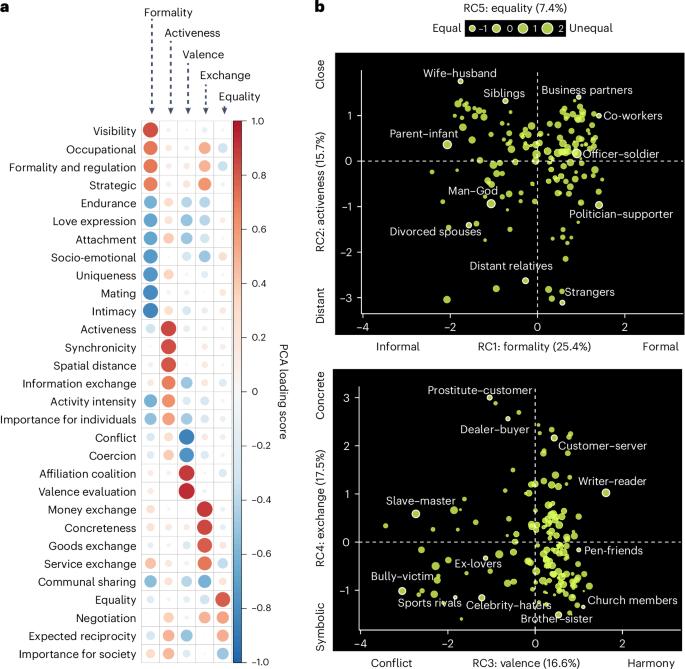跨越现代和历史文化的人际关系的概念结构
IF 15.9
1区 心理学
Q1 MULTIDISCIPLINARY SCIENCES
引用次数: 0
摘要
智人社会复杂性的一个决定性特征是我们关系的多样性。我们在家庭、工作场所、邻里和网络社区中建立各种类型的联系。我们如何理解如此复杂的人际关系系统?社会科学对关系的基本组织进行了长期的研究,但尚未达成共识。在这里,我们使用在线调查、实验室认知任务和自然语言处理,在世界各地不同的现代文化(n = 20,427)和跨越3000年历史的古代文化中,我们研究了人们概念化关系的方式的普遍性和文化变异性。我们发现了一个关系概念的普遍表征空间,包括五个主要维度(正式性、主动性、价态、交换和平等)和三个核心类别(敌对关系、公共关系和私人关系)。我们的工作揭示了人类关系知识的基本认知结构和文化原则,并促进了我们对人类社会性的理解。本文章由计算机程序翻译,如有差异,请以英文原文为准。


The conceptual structure of human relationships across modern and historical cultures
A defining characteristic of social complexity in Homo sapiens is the diversity of our relationships. We build connections of various types in our families, workplaces, neighbourhoods and online communities. How do we make sense of such complex systems of human relationships? The basic organization of relationships has long been studied in the social sciences, but no consensus has been reached. Here, by using online surveys, laboratory cognitive tasks and natural language processing in diverse modern cultures across the world (n = 20,427) and ancient cultures spanning 3,000 years of history, we examined universality and cultural variability in the ways that people conceptualize relationships. We discovered a universal representational space for relationship concepts, comprising five principal dimensions (formality, activeness, valence, exchange and equality) and three core categories (hostile, public and private relationships). Our work reveals the fundamental cognitive constructs and cultural principles of human relationship knowledge and advances our understanding of human sociality. Cheng et al. explore the universality and cultural variability in how people understand human relationships, revealing a five-dimensional framework for relationship concepts across both modern and ancient societies.
求助全文
通过发布文献求助,成功后即可免费获取论文全文。
去求助
来源期刊

Nature Human Behaviour
Psychology-Social Psychology
CiteScore
36.80
自引率
1.00%
发文量
227
期刊介绍:
Nature Human Behaviour is a journal that focuses on publishing research of outstanding significance into any aspect of human behavior.The research can cover various areas such as psychological, biological, and social bases of human behavior.It also includes the study of origins, development, and disorders related to human behavior.The primary aim of the journal is to increase the visibility of research in the field and enhance its societal reach and impact.
 求助内容:
求助内容: 应助结果提醒方式:
应助结果提醒方式:


